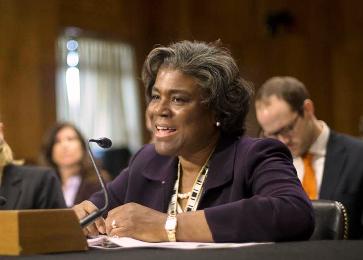US backs all-inclusive political dialogue in South Sudan
February 4, 2014 (ADDIS ABABA) – The United States Assistant Secretary for African Affairs, Linda Thomas-Greenfield, said the administration of President Barak Obama supports inclusive political dialogue on all relevant issues to end the six-week-old crises in South Sudan.

Officials at the Ethiopian ministry of foreign affairs on Tuesday told Sudan Tribune that the US envoy has reaffirmed that the Obama administration’s fully supports the mediation efforts spearheaded by East African regional bloc, the Intergovernmental Authority on Development (IGAD) to resolve the crisis in South Sudan.
Thomas-Greenfield was briefed by the Ethiopian foreign Minister on the ceasefire agreement recently signed in Addis Ababa between the Government of South Sudan and those who have split from the ruling party – the SPLM – and the rebels-turned-national army (SPLA), who have named themselves the SPLM/A in Opposition
She was also briefed on IGAD’s ceasefire monitoring team which has been deployed to South Sudan and the issue of the four political figures who remain detained in connection with an alleged coup plot.
As part of the broader peace pact, the South Sudanese government last week freed seven of the 11 political prisoners. Regional and international bodies have continued to put pressure on the Juba government to release of the remaining four senior SPLM figures.
The African Union has urged both warring parties to withdraw all their preconditions and show the political will to engage fully in the peace process that is due to resume in Addis Ababa later this week.
“Progress was slow, but positive” Adhanom told Thomas-Greenfield adding “IGAD, and Ethiopia, would continue every effort to encourage an all-inclusive political dialogue in South Sudan.”
She commended the relentless efforts IGAD mediators are exerting to resolve South Sudan crises and praised Ethiopia’s role in working towards peace and stability across the volatile east African region.
The fragile ceasefire agreement signed on January 23 recently aimed to allow space for an all-inclusive dialogue to address the root causes of this crisis. However, the deal has been repeatedly violated by both sides, dampening hopes of a comprehensive solution.
African leaders at AU summit held last week has said that crisis in South Sudan could not be resolved on the battlefield but by engagement and reconciliation.
WAS IT A COUP?
Last month Thomas-Greenfield said that the rift within the ruling SPLM and the consequent fighting between the members of the armed forces from December 15 onwards.
“We’ve not seen any evidence that this was a coup attempt, but it certainly was the result of a huge political rift between Riek Machar and the president,” Linda Thomas-Greenfield, told the Senate Foreign Relations Committee hearing on South Sudan crisis in early January.
The US official’s remarks appeared to directly contradict the narrative of President Salva Kiir’s government who insist that his former deputy Riek Machar attempted to overthrow him in a coup.
Machar has denied the accusation, saying it was the regime’s tactic to suppress opposition within the party.
The violence, which started in the capital, Juba later spread to Jonglei, Unity and Upper Nile states. The United Nations say that over a million people have been displaced. Around 10,000 people have died according to an estimate by the International Crisis Group.
REGIONAL CONCERNS
The Ethiopian Minister and the US envoy also conferred on bilateral and regional issues including the situations in Somalia and on the unresolved disputes between Ethiopia and Eritrea.
With regard to Eritrea, Adhanom said Ethiopia was ready to normalise ties with Eritrea if the Red Sea nation is willing to engage in political dialogue based on five principles Ethiopia set in 2004.
Between 1998 and 2000, Ethiopia and Eritrea fought bitter war over disputed border which claimed the lives of some 70,000 people.
Last month Sudan said it has begun mediating indirect talks between leaders of Addis Ababa and Asmara, a claim Ethiopian officials wouldn’t confirm to Sudan Tribune.
“We started some efforts to normalise the relations between Ethiopia and Eritrea,” President Omar Al Bashir was quoted as saying by Sudanese news outlets following his visit to Eritrea a few weeks ago.
Eritrea, formerly a province of Ethiopia gained independence in 1993 after 30-year war for independence.
(ST)
